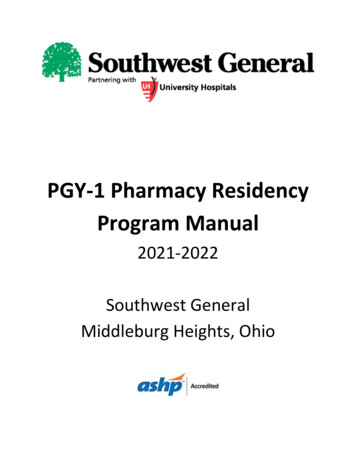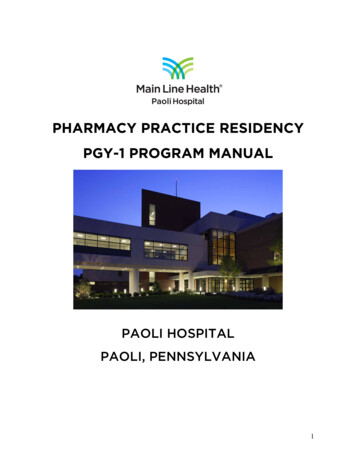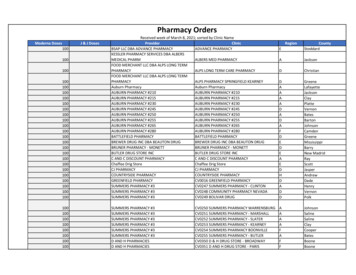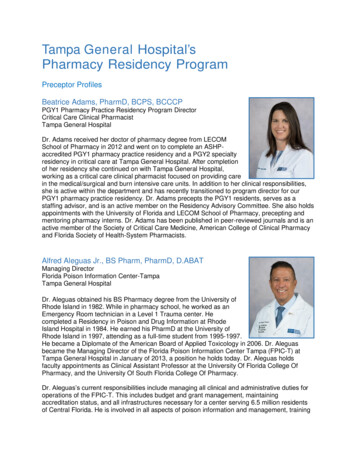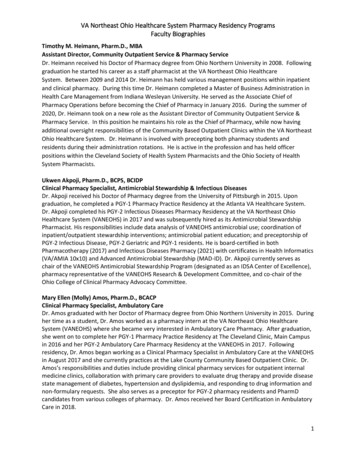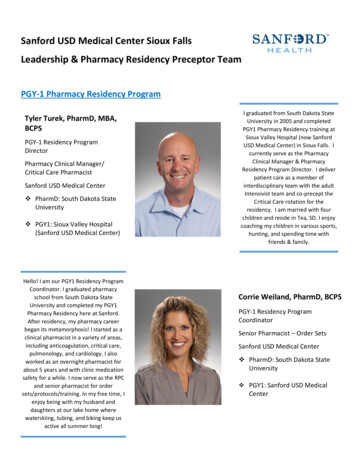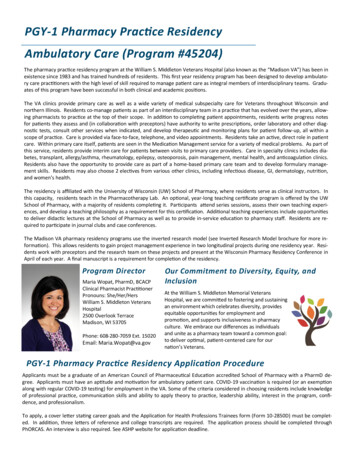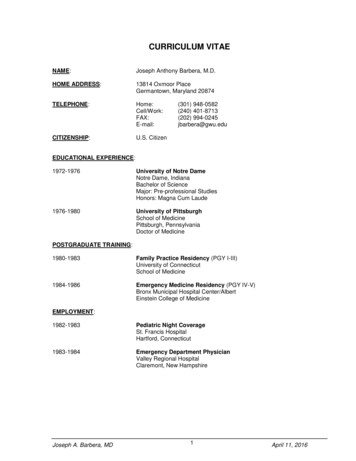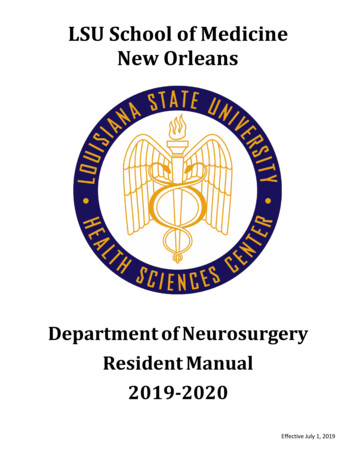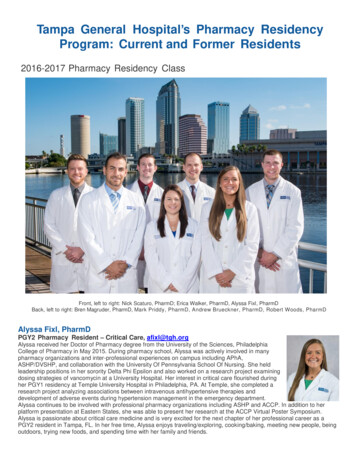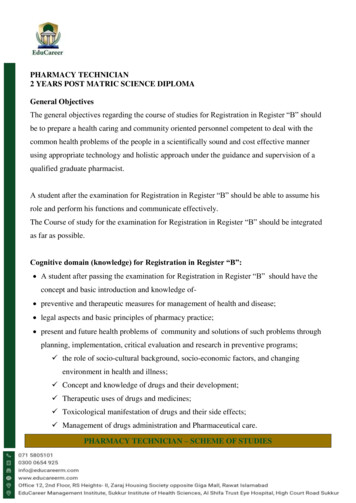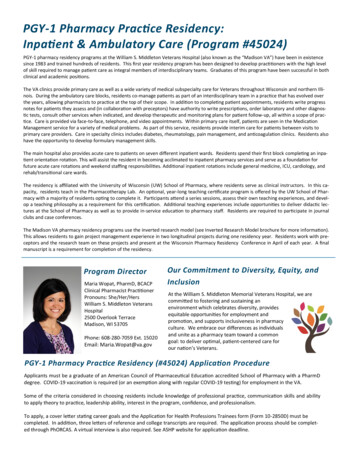
Transcription
PGY-1 Pharmacy Practice Residency:Inpatient & Ambulatory Care (Program #45024)PGY-1 pharmacy residency programs at the William S. Middleton Veterans Hospital (also known as the “Madison VA”) have been in existencesince 1983 and trained hundreds of residents. This first year residency program has been designed to develop practitioners with the high levelof skill required to manage patient care as integral members of interdisciplinary teams. Graduates of this program have been successful in bothclinical and academic positions.The VA clinics provide primary care as well as a wide variety of medical subspecialty care for Veterans throughout Wisconsin and northern Illinois. During the ambulatory care blocks, residents co-manage patients as part of an interdisciplinary team in a practice that has evolved overthe years, allowing pharmacists to practice at the top of their scope. In addition to completing patient appointments, residents write progressnotes for patients they assess and (in collaboration with preceptors) have authority to write prescriptions, order laboratory and other diagnostic tests, consult other services when indicated, and develop therapeutic and monitoring plans for patient follow-up, all within a scope of practice. Care is provided via face-to-face, telephone, and video appointments. Within primary care itself, patients are seen in the MedicationManagement service for a variety of medical problems. As part of this service, residents provide interim care for patients between visits toprimary care providers. Care in specialty clinics includes diabetes, rheumatology, pain management, and anticoagulation clinics. Residents alsohave the opportunity to develop formulary management skills.The main hospital also provides acute care to patients on seven different inpatient wards. Residents spend their first block completing an inpatient orientation rotation. This will assist the resident in becoming acclimated to inpatient pharmacy services and serve as a foundation forfuture acute care rotations and weekend staffing responsibilities. Additional inpatient rotations include general medicine, ICU, cardiology, andrehab/transitional care wards.The residency is affiliated with the University of Wisconsin (UW) School of Pharmacy, where residents serve as clinical instructors. In this capacity, residents teach in the Pharmacotherapy Lab. An optional, year-long teaching certificate program is offered by the UW School of Pharmacy with a majority of residents opting to complete it. Participants attend a series sessions, assess their own teaching experiences, and develop a teaching philosophy as a requirement for this certification. Additional teaching experiences include opportunities to deliver didactic lectures at the School of Pharmacy as well as to provide in-service education to pharmacy staff. Residents are required to participate in journalclubs and case conferences.The Madison VA pharmacy residency programs use the inverted research model (see Inverted Research Model brochure for more information).This allows residents to gain project management experience in two longitudinal projects during one residency year. Residents work with preceptors and the research team on these projects and present at the Wisconsin Pharmacy Residency Conference in April of each year. A finalmanuscript is a requirement for completion of the residency.Program DirectorMaria Wopat, PharmD, BCACPClinical Pharmacist PractitionerPronouns: She/Her/HersWilliam S. Middleton VeteransHospital2500 Overlook TerraceMadison, WI 53705Phone: 608-280-7059 Ext. 15020Email: Maria.Wopat@va.govOur Commitment to Diversity, Equity, andInclusionAt the William S. Middleton Memorial Veterans Hospital, we arecommitted to fostering and sustaining anenvironment which celebrates diversity, providesequitable opportunities for employment andpromotion, and supports inclusiveness in pharmacyculture. We embrace our differences as individualsand unite as a pharmacy team toward a commongoal: to deliver optimal, patient-centered care forour nation’s Veterans.PGY-1 Pharmacy Practice Residency (#45024) Application ProcedureApplicants must be a graduate of an American Council of Pharmaceutical Education accredited School of Pharmacy with a PharmDdegree. COVID-19 vaccination is required (or an exemption along with regular COVID-19 testing) for employment in the VA.Some of the criteria considered in choosing residents include knowledge of professional practice, communication skills and abilityto apply theory to practice, leadership ability, interest in the program, confidence, and professionalism.To apply, a cover letter stating career goals and the Application for Health Professions Trainees form (Form 10-2850D) must becompleted. In addition, three letters of reference and college transcripts are required. The application process should be completed through PhORCAS. A virtual interview is also required. See ASHP website for application deadline.
PGY-1 General Pharmacy Practice Residency(Inpatient & Outpatient) - Acute Care RotationsInpatient Orientation - Throughout this rotation, residents become familiar with the process for inpatient pharmacy includingorder entry and verification, outpatient processing, kinetic and anticoagulation monitoring, formulary processes, medicationreconciliation upon admission and discharge, discharge counseling, overview of technician functions including our admissionhistory technicians, controlled substance protocols, and other responsibilities. Residents maintain close contact with their primarypreceptor, as well as gain experience with inpatient staff within their respective services. The exposures that residents receive inthis orientation are applied to their subsequent general inpatient rotations.Acute Care General Medicine - The purpose of this rotation is to prepare the resident with skills necessary to become a competentinpatient clinical pharmacist. This rotation will allow the resident to gain experience in managing pharmacotherapy for acutely illpatients, to develop independent judgment and accountability, and to improve the verbal and written communication skillsnecessary to be an effective clinical pharmacy practitioner. Training activities will involve rounding with a medical team andmonitoring patient medication profiles daily to ensure the provision of evidence-based, patient-centered medication therapymanagement. This will include monitoring for appropriate dosing and indication, efficacy, adverse effects, and cost-effectiveness.The resident will answer drug information questions, perform pharmacokinetic monitoring, obtain medication histories, andprovide medication education and counseling for their patients. The resident will learn to be a liaison between the pharmacyservice and other health-care providers, serving as an active member of an interdisciplinary team. The resident will also be involvedin precepting pharmacy students and providing education to staff such as leading journal article discussions or presentingeducational inservices.Critical Care - There are two intensive care units at the Madison VA. The patient population on these units is a mix of surgical(cardiac, general/thoracic, and neurosurgery) and medical (cardiac, pulmonary, infectious disease). Patients on these units aremanaged by medical, surgical or specialty teams. An oversight team, comprised of a critical care pharmacist, an intensivist orinternist, a nutritionist, intensive care nurses and a respiratory therapist, provide review of care during rounds on Monday throughFriday. The critical care pharmacist, in addition to participating in rounds and providing review of care, performs medicationhistories, tube feeding consultations, pharmacokinetic consultations, precepts pharmacy students, answers drug informationquestions, and completes medication discharges.Long-Term Care/Community Living Center - The purpose of this rotation is to provide the resident with pharmacy experience in along-term care environment. The Madison VA Community Living Center (CLC) is a 26 bed facility that cares for patients who are nolonger acutely ill, but have continued needs for skilled nursing, rehabilitation or hospice care. This rotation will allow the residentto gain experience in managing pharmacotherapy for these patients, to develop independent judgment and accountability, and toimprove the verbal and written communication skills necessary to be an effective clinical pharmacy practitioner. The resident willbe assigned patients and be responsible for all their pharmacy care. This includes their initial intake note which requires the resident to document a comprehensive review of all of a patient’s disease states and medications. Additionally, the resident will complete daily monitoring including anticoagulation and pharmacokinetic notes, discharge counseling, and attending interdisciplinarymeetings and discussing any patient care needs with the entire team.Antimicrobial Stewardship - This experience provides exposure to antibiotic use in the inpatient and outpatient settings. The Infectious Disease (ID) service is consulted by inpatient medical teams when more complex cases are encountered. Antibiotic stewardship provides input to the ID service. During the course of the day, the resident will assess allergies on newly admitted patients,evaluate patients on the ID service, participate in rounds, perform audit and feedback on inpatients, and respond to drug information requests from inpatient and outpatient providers.Cardiology - The cardiology rotation at the Madison VA will help familiarize residents with the management of medication therapyin patients with cardiovascular disease. The rotation will expose residents to arrhythmias, heart failure, ACS, ACLS, heart and lungtransplantation, anticoagulation, and cardiothoracic surgery concepts. The resident will be an involved member of the medicalteam through daily monitoring and inpatient rounding activities. Patients on the cardiology service are followed by the cardiologygeneral care and intensive care units, and the resident will be responsible for the patients assigned by the preceptor. Otherresponsibilities include journal clubs, topic discussions, and patient education activities.
PGY-1 General Pharmacy Practice Residency(Inpatient & Outpatient) - Ambulatory Care RotationsAnticoagulation – This clinic is pharmacist managed and is responsible for managing all VA patients receiving warfarin and directoral anticoagulants (DOACs) from our hospital; the clinic provides care for over 700 Veterans. Residents complete telephone andvideo appointments primarily to assure safe and effective use of antithrombotic therapy. They also initiate therapy andparticipate in transitions of care from inpatient to outpatient. Residents coordinate warfarin interruptions for procedures, usinglow molecular weight heparin if warranted, and are involved with patient education as needed.Diabetes – Patients with complicated and difficult to control diabetes are referred to this clinic. The clinic uses amultidisciplinary approach to the management of Type 1 and Type 2 Diabetes. Residents see patients in both aPharmacist-managed clinic and in a clinic staffed by both Pharmacist and Endocrinologist attendings. The residentis responsible for all aspects of diabetes-related care. The program is structured to provide the resident theopportunity to monitor the safety and efficacy of drug therapy in ambulatory care settings, including medicalrecord review, patient interview and targeted physical assessment, interpretation of laboratory data, consultationwith staff, and patient education to achieve optimal patient outcomes. In addition to face-to-face clinic appointments, telephone follow up is completed using patient home glucose monitoring.Formulary Management – Residents are responsible for a variety of duties during this rotation, including education and guidanceof prescribing through electronic consults and ordering tools; review of non-formulary drug requests for appropriateness, safety,and cost effectiveness; monitoring medical center medication utilization to identify areas for improvement; management of national cost saving initiatives; working on formulary conversions; completing a medication use evaluation; and management of the adverse drug reaction program. Requirements for completion of this rotation include completion of one drug monograph, onemedication use evaluation, documentation of adverse drug reactions, clinical reviews pertaining to non-formulary or restrictedmedication requests, completion of new patient orientation notes, assisting with management of manufacturer back orders, PBM/FDA Patient Safety Alerts, and pharmacists clinical interventions. Residents may also be required to attend Madison P&T, regionalP&T, and regional PBM meetings during this rotation.Heart Failure – The Heart Failure (HF) Clinical Pharmacy Practitioner (CPP) serves as a provider within the MadisonVA multidisciplinary Cardiology service. Cardiology providers refer patients to the HF CPP for optimization ofguideline-directed medical therapy. Residents will provide care primarily through telephone encounters with inclinic encounters as appropriate. Residents will evaluate home vital data, pertinent labs, review of symptoms, andmedication tolerability to develop a plan for medication optimization. Residents will also provide education onhome monitoring and lifestyle factors for optimal HF self-management.Hypertension – Patients with renal disease and difficult to control hypertension are referred to this clinic. Because this clinic ishoused with the Renal service, residents work closely with a pharmacist preceptor as well as Renal attendings and fellows. Theresident will assess a patient’s blood pressure during telephone appointments primarily. Residents will evaluate pertinent labs and make medication adjustments as needed. Residentswill also provide education on blood pressure monitoring and lifestyle factors that can contribute to hypertension.
PGY-1 General Pharmacy Practice Residency(Inpatient & Outpatient) - Ambulatory Care RotationsInfectious Disease – The ID clinic serves as the primary care clinic for all HIV patients at the Madison VA. It is also a consult clinicfor patients with severe or chronic infectious diseases. All patients on home IV antibiotics are followed by the ID clinic. Experiences during the rotation may include HIV, home infusion, diabetic or ischemic ulcers, wound care, and treatment of conditions including osteomyelitis, endocarditis, and more.Medication Management – Residents manage care of chronic disease states for Veterans by ordering andinterpreting labs and prescribing and adjusting medications. They are responsible for the education and follow-upof their patients. Residents staff care plans with clinical pharmacists. Patients seen in this clinic are referred bytheir primary provider for co-management of chronic conditions including hypertension, hyperlipidemia, diabetes,hypothyroidism, BPH, gout, COPD, and others. Residents will also receive training in Patient Aligned Care Teams(PACT) working alongside Primary Care Providers to address chronic disease state needs and improveepidemiologic patient outcomes through population management.Mental Health – This rotation provides residents with a broad interdisciplinary experience. Residents gain experience inmedication management in a pharmacist-run clinic, including participation in our centralized intake system. Objectives includeexperiential learning of different DSM-IV axial diagnosis, clinical interview skills, psychopharmacology initiation, monitoring andevaluation, as well as completion of a mental health-related project.Outpatient Pharmacy – The Madison VA Outpatient pharmacy primarily dispenses medications to patients seen in clinic, the emergency room, and hospital discharges. Residents will gain experience at the counseling window where pharmacist medication consultation is completed as well as prescription processing. Other areas residents may be exposed to include finishing electronic prescriptions, verification station, controlled substance vault, and pharmacy telephone station.Pain Management – The Pain Management team is an interdisciplinary team comprised of a neurologist, rehabilitation medicinespecialist, nurse practitioner, clinical psychologist, and clinical pharmacist. Patients are referred to the clinic for chronic painmanagement with an emphasis on improvement of quality of life. Residents are responsible for reviewing patients’ painmedication histories prior to their first visit with the clinic and assisting with selection of appropriate medication treatment.Residents are also required to perform telephone follow-ups with patients following any changes in their pain medication regimen.Rheumatology – Patients with a wide variety of rheumatologic disorders are cared for in this clinic. Residents provide direct patient care including physical assessment and development of therapeutic and monitoring plans. Thesepatients are co-managed with a Pharmacist preceptor and Rheumatologist attending physicians.Tobacco Treatment – This is a clinic run by the pharmacy residents and a clinical pharmacist. Residents providetobacco cessation counseling and evidence-based medication therapy through group sessions and individual phonecounseling. Participation in group sessions may be through face-to-face meeting and video conference. This is afree service for Veterans.Transplant — This rotation will allow the resident to gain experience in managing pharmacotherapy for transplant patients, to develop independent judgment and accountability, and to improve the verbal and written communication skills necessary to be aneffective clinical pharmacy practitioner. Care delivery is by face-to-face and telephone encounters.
PGY-1 General Pharmacy Practice Residency(Inpatient & Outpatient) - Academic OpportunitiesTeaching ResponsibilitiesOne of the goals of the residency program is to provide residents with the opportunity to develop and improve theircommunication and teaching skills. As part of their residency appointment, Madison VA residents have an appointmentas Clinical Instructors at the UW School of Pharmacy. With this appointment, residents spend five weeks over thecourse of the year teaching in the Pharmacotherapy Laboratory at the School of Pharmacy. This course focuses onclinical application of various therapeutic topics and skills. The appointment also grants residents access to UWresources including the medical library. In addition, residents are involved in a number of ongoing teaching and inservice activities including the following: Residents provide in-services to hospital administrative personnel, nurses, pharmacy personnel, students, andproviders as assigned by rotation preceptors. Residents may help precept pharmacy students completing introductory or advanced pharmacy practice expe-riences at the VA hospital. Residents have an extensive role in precepting students through the hospital’s student internship program thatis designed for pharmacy students who have completed their second year of pharmacy school.Teaching Certificate Program with the University of WisconsinThe teaching certificate is a separate, voluntary program that complements the experiencesobtained in the Pharmacotherapy Laboratory. Residents are taught strategies to teach theadult learner, facilitate discussions and design a lecture. As part of this program, residentstake turns presenting the course topics and facilitating discussions. In addition, guidance isprovided on the development of a teaching portfolio and a completed teaching portfoliomust be submitted to receive a certificate. A certificate, signed by the Dean of the School ofPharmacy, will be presented to the resident after successful completion of this program.Topics discussed in the Teaching Certificate Program include: Creating a lessonplan Creating abstracts &posters Facilitating classroomlearning Providing effectivefeedback Objectives &outcomes Methods to assess studentlearning Matching your teachingstyle to the learningenvironment Designing and implementingan effective rotation
PGY-1 General Pharmacy Practice Residency(Inpatient & Outpatient) - Other ActivitiesResidency Research ProjectThe Madison VA pharmacy residency programs use the invertedresearch model, or IRM (see Inverted Research Model brochure foundon the residency website for more information). In the IRM, incomingresidents complete a project that has already progressed throughbackground research, protocol development, and IRB approval (ifapplicable).The Wisconsin Pharmacy Residency Conference is held annually at the Monona Terracein Madison, WI.During the first half of the year, residents are involved in datacollection, data analysis, presentation, and manuscript submission asthey finish this project. During the second half of the year, residents start a project to be finished the nextresidency year, performing the background research, developing the protocol, and obtaining IRB approval (ifapplicable). This model allows residents to gain project management experience in two longitudinal projectsduring one residency year. Residents work with preceptors and the research team on these projects and presentat the Wisconsin Pharmacy Residency Conference in April of each year, which is held in conjunction with thePharmacy Society of Wisconsin’s Educational Conference.In-ServicesEach resident presents a minimum of two formal presentations during the year on a topic of the resident’schoosing. The purpose of the formal presentations is to improve the resident's ability to prepare for a formalpresentation with handouts, to provide an oral presentation to peers, to provide an opportunity for education forthe other residents and staff, and to increase the resident's familiarity with various types of literature associatedwith pharmacotherapy.Journal ClubsResidents are required to attend and participate in the Pharmacy Residency Journal Club. This activity iscoordinated by the Education and Research Coordinator. Residents present journal articles and supportinteractive discussions of presented articles. The Journal Club meets weekly during the residency year and isregularly attended by residents, pharmacists, and students.Case ConferencesResidents and preceptors meet once a month to discuss interesting patient cases, clinical pearls,or new information learned during rotations. This activity is coordinated by the Education andResearch Coordinator. Residents take turns preparing cases to present. These sessions providean opportunity to learn with and from fellow residents and preceptors about interesting,challenging, or unique clinical questions.
The residency is affiliated with the University of Wisconsin (UW) School of Pharmacy, where residents serve as clinical instructors. In this ca-pacity, residents teach in the Pharmacotherapy Lab. An optional, year-long teaching certificate program is offered by the UW School of Phar-macy with a majority of residents opting to complete it.
